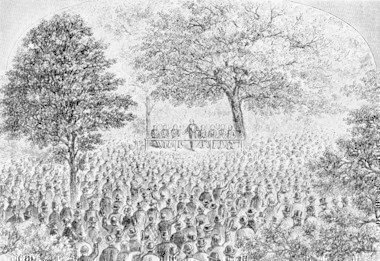On July 6, 1854, disgruntled voters in a new political party named its first candidates to contest the Democrats over the issue of slavery. Within six and one-half years, the newly christened Republican Party would control the White House and Congress as the Civil War began.
For a brief time in the decade before the Civil War, the Democratic Party of Andrew Jackson and his descendants enjoyed a period of one-party rule. The Democrats had battled the Whigs for power since 1836 and lost the presidency in 1848 to the Whig candidate, Zachary Taylor. After Taylor died in office in 1850, it took only a few short years for the Whig Party to collapse dramatically.
By 1854, the battle between pro-slavery and anti-slavery factions ended the Whig party as a force in American politics. The Kansas-Nebraska Act was passed, allowing new territories and states to decide on their own if they would allow slavery. The act was a fatal blow to unity within the Whig Party.
There are at least three dates recognized in the formation of the Republican Party in 1854, built from the ruins of the Whigs. The first is February 24, 1854, when a small group met in Ripon, Wisconsin, to discuss its opposition to the Kansas-Nebraska Act. The group called themselves Republicans in reference to Thomas Jefferson’s Republican faction in the American republic’s early days. Another meeting was held on March 20, 1854, also in Ripon, where 53 people formally recognized the movement within Wisconsin.
On July 6, 1854, a much-bigger meeting in Jackson, Michigan was attended by about 10,000 people and is considered by many as the official start of the organized Republican Party. By the end of the gathering, the Republicans had compiled a full slate of candidates to run in Michigan’s elections.
Horace Greeley, the newspaper publisher, had officially christened the group as Republicans in an editorial before the meeting.
"We should not care much whether those thus united [against slavery] were designated 'Whig,' 'Free Democrat' or something else; though we think some simple name like 'Republican' would more fitly designate those who had united to restore the Union to its true mission of champion and promulgator of Liberty rather than propagandist of slavery,” he wrote.
Today, the official Republican Party website recognizes that the party’s first meeting was held in Ripon, and that “the Party was formally organized in July 1854 by thousands of anti-slavery activists at a convention in Jackson, Michigan.” (There is still some disagreement, at least in Michigan and Wisconsin, about bragging rights.)
The Republicans made quick inroads with their anti-slavery platform that year as a regional party, even getting their candidate, Kinsley Bingham, elected as Michigan’s governor.
But in 1854 the Republicans had rivals in other northern states. These rivals were popularly called the Know Nothings (or the Native American or American party). They were loosely organized and campaigned on an anti-immigrant platform. Like the Whigs, the Know Nothings were also divided over slavery, eventually fading away after 1856.
By the end of the 1856 election year, the Republican Party had become a national power. Although the party’s first presidential candidate, John Fremont, lost to James Buchanan, the Republicans did surprisingly well in the Electoral College, taking most of the northern states.
The Democrats benefited from the Know Nothings diverting votes in Pennsylvania, Indiana, Illinois and New Jersey from Fremont. Four years later, the Republicans would take those four states. Their candidate, Abraham Lincoln, would easily win the electoral vote in 1860, securing the presidency for the Republican Party.








